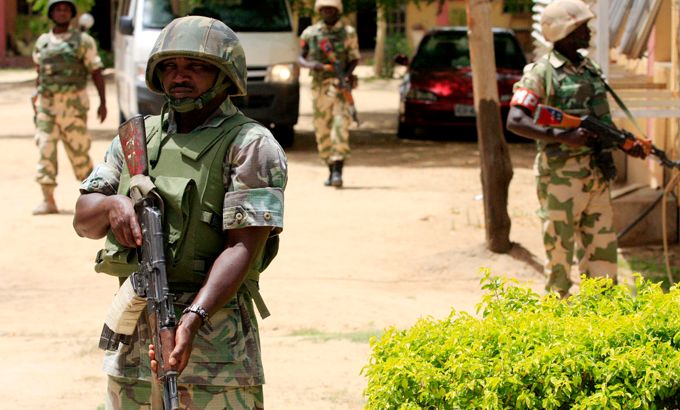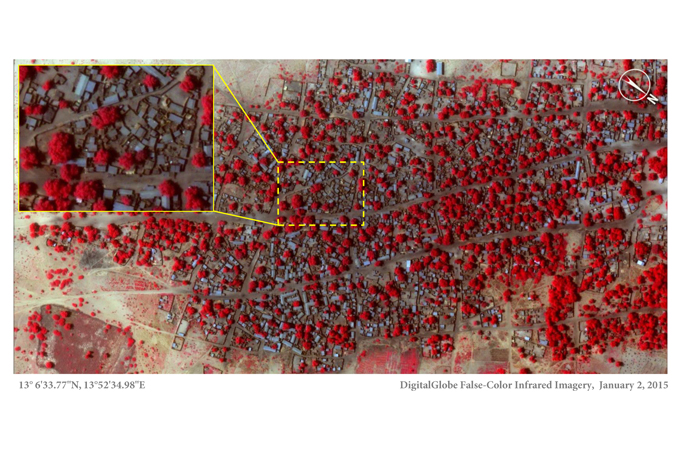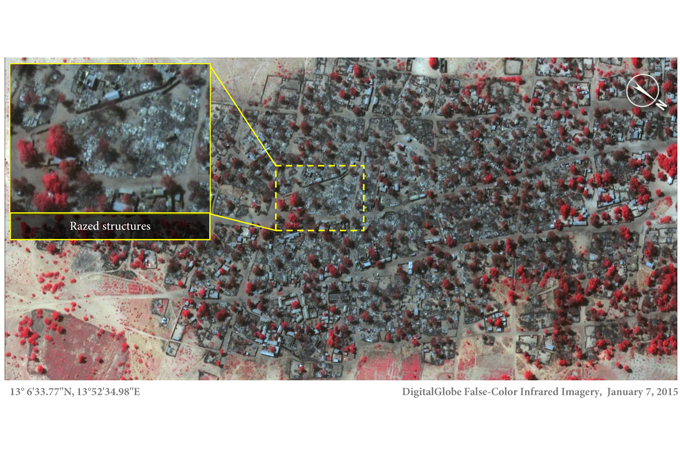Images show scale of Boko Haram devastation
Amnesty International releases satellite images showing “catastrophic destruction” of two Nigerian towns last week.

Human rights group Amnesty International has released satellite images showing what it says is “indisputable and shocking evidence” of the scale of last week’s attack on two Nigerian towns by Boko Haram fighters.
Before and after images of two neighbouring towns, Baga and Doro Gowon in northern Nigeria taken on January 2 and 7, show the devastating effect of the attacks which left more than 3,700 structures damaged or completely destroyed.
Keep reading
list of 4 itemsTen years after Chibok girls kidnapping: One woman’s struggle to move on
Ten years after ‘Bring Back Our Girls,’ Nigeria’s kidnappings continue
Why mass kidnappings still plague Nigeria a decade after Chibok abductions
Other nearby towns and villages were also attacked over this period, the human rights group said on Thursday.
“These detailed images show devastation of catastrophic proportions in two towns, one of which was almost wiped off the map in the space of four days,” said Daniel Eyre, Nigeria researcher for Amnesty International.
Amnesty said interviews with witnesses as well as local government officials and human rights activists suggest hundreds of civilians were shot. Last week, the human rights group noted reports of as many as 2,000 dead. The Nigerian military has cited a figure of 150 dead, including slain fighters.
“Of all Boko Haram assaults analysed by Amnesty International, this is the largest and most destructive yet. It represents a deliberate attack on civilians whose homes, clinics and schools are now burnt out ruins,” he added.
The analysis shows just two of the many towns and villages that fell victim to a series of Boko Haram attacks which began on January 3.
 |
| Satellite image of the village of Doro Baga (aka Doro Gowon) in northeastern Nigeria taken on January 2. The red areas indicate healthy vegetation. |
Al Jazeera’s Ahmed Idris, reporting from Abuja, said survivors have told stories of being chased by Boko Haram fighters for days, with one boy recalling how he was forced to watch his family members being shot dead in front of him.
A mother told Al Jazeera that she had fled with two of her children, but could not find her third.
She said that Boko Haram fighters had systematically attacked homes and that she had encountered many dead bodies as she tried to escape to safety.
A man in his 50s told Amnesty what happened in Baga during the attack: “They killed so many people. I saw maybe around 100 killed at that time in Baga. I ran to the bush. As we were running, they were shooting and killing.” He hid in the bush and was later discovered by Boko Haram fighters, who detained him in Doron Baga for four days.
Medical charity Doctors Without Borders said on Tuesday that its team in the Borno State capital, Maiduguri, was providing assistance to 5,000 survivors of the attack.
More than 3,700 structures were damaged or completely destroyed – 620 in Baga and more than 3,100 in Doron Baga, Amnesty said but added that the number could be higher.
 |
| Satellite image 2, taken on January 7, shows almost all of the structures razed and much of the vegetation cleared. The inset demonstrates the level of destruction of most structures in the town. |
US Secretary of State John Kerry said in Sofia, Bulgaria, on Thursday that he and British Foreign Secretary Philip Hammond are discussing a special initiative to deal with Boko Haram in Nigeria, but did not elaborate any further.
Kerry described the group as “one of the most evil and threatening terrorist entities on the planet”.
Meanwhile, the Danish government allocated $2m to help the victims of Boko Haram. Mogens Jensen, the country’s foreign aid minister, said on Thursday that Denmark was acting “in solidarity with the affected families” and wanted to give them clothes, food, shelters and “a possibility to get through the crisis”.
Security analysts have said that it may be impossible to know exactly how many were killed, with the town and surrounding area still in rebel control and access impossible.
The Baga attack came before presidential and parliamentary elections in Nigeria next month and an upsurge in violence apparently designed to undermine the legitimacy of the vote.
Nigeria’s home-grown Boko Haram group drew international condemnation when its fighters kidnapped 276 schoolgirls from a boarding school in northeast Chibok town last year. Dozens escaped but 219 remain missing.